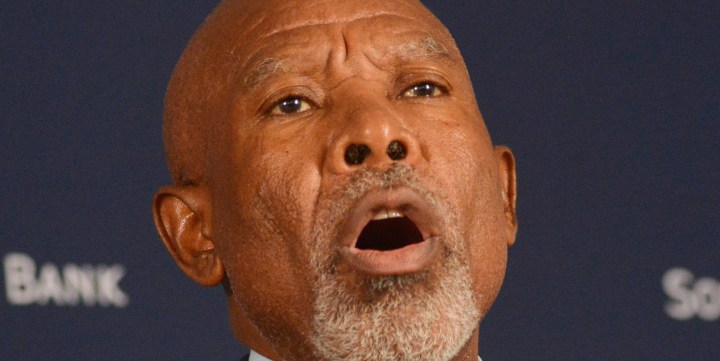MONETARY POLICY COMMITTEE
SA Reserve Bank hikes repo rate by 50 basis points after inflation, rand set alarm bells ringing

The South African Reserve Bank pulled both triggers on its monetary policy shotgun on Thursday, raising its key repo rate by 50 basis points, confounding expectations of a rise of 25 basis points. Stubbornly high inflation and the rand’s vulnerability are red flags for a bank with a laser focus on inflation.
The 50 basis point hike announced at the end of the Monetary Policy Committee’s (MPC’s) three-day meeting takes the repo rate to 7.75% and the prime lending rate for consumers to 11.25%.
This was the SA Reserve Bank’s ninth consecutive rate hike, bringing the cumulative increase to 4.25% since late 2021.
One of the SA Reserve Bank’s concerns is the rand’s exchange rate, and the reaction on that front was immediately favourable. Within minutes of the announcement, the rand rose to 17.88/dollar from 18/dollar beforehand, and extended that rally to 17.85/dollar by late Thursday afternoon trade, its highest level in about seven weeks.
A point that economists often seem to miss is that SA Reserve Bank governor Lesetja Kganyago and the other four members of the MPC are not fooling around when it comes to containing inflation.
“They actually believe that the central bank is not serious about tackling inflation. But we are serious about tackling inflation. And we have been taking steps since November 2021 to tackle inflation. And today we are taking a further step in tackling inflation. And I am sure, very soon, that they will think like us,” a visibly agitated Kganyago said during the Q&A session.
That was a pretty clear message to economists.
South African consumer price inflation accelerated on an annual basis to 7% in February from 6.9% in January, with food inflation and non-alcoholic beverage inflation hitting a 14-year high of 13.6%.
That may have been a factor in this decision. But Razia Khan, the Chief Africa Economist at Standard Chartered Bank in London, noted that: “… the [SA Reserve Bank] very rarely bases any policy decision on past inflation. Of more concern, especially given the recent newsflow on wage negotiations, is whether inflation expectations are at risk of being anchored at a much higher level.
“The [SA Reserve Bank] hopes that the more aggressive pace to its tightening will send an important message to stakeholders that it is serious about meeting its inflation target,” Khan added.
The SA Reserve Bank’s target range is 3% to 6% and it really prefers to see it at the bottom of that range.
“Risks to the inflation outlook … are assessed to the upside,” the MPC statement said.
“Domestic food price inflation surprised higher again in February, and risks of drier weather conditions have increased. Load shedding may additionally have broader price effects on the cost of doing business and the cost of living, in particular as diesel consumption increases.”
The mention of the impact of power cuts on inflation – it is usually framed around its corrosive effects on economic growth – was a pointed one.
During the Q&A, the governor responded to a question about estimates of the impact of power shortages on inflation.
“We are busy with that exercise,” he said. “It’s not an easy exercise. I am sure my colleagues will forgive me if I share this with you. We estimate that load shedding has added 0.5% to overall inflation.”
Kganyago described the exercise as a “nightmare” and hastened to add that the 0.5% figure was a “guesstimate” for now. But it shows how the rolling blackouts have focused the central bank’s mind – it is the main show in town at the moment. And largely because of them, the SA Reserve Bank cut its economic growth forecast for South Africa to 0.2% from an already meagre 0.3%.
One of the difficulties in measuring the impact of the power cuts on inflation also probably relates to how they are kneecapping economic growth, a trend that in turn is a drag on demand and inflationary pressures. How does one square that with the surging costs of living and doing business? As the governor said, it’s probably a “nightmare”.
The SA Reserve Bank is also extremely concerned about the rand and its exchange rate, which also plays a key role on the inflation front.
“South Africa’s risk premium is sharply higher and will likely remain elevated over the forecast period. Given load shedding, upside inflation risks, and larger external financing needs, further currency weakness appears likely,” the MPC statement said.
Will this mark the end of the hiking cycle? Many economists seem to think so. But then, this is a central bank that is serious about tackling inflation. DM/BM



















 Become an Insider
Become an Insider
So what is the real impact across a series of increases.. Rates and taxes in Jhb on the back of synthetic rates valuation roll, imported inflation and fuel costs, independent energy costs and spiraling debt cost. Quite exactly how the average consumer is supposed to have anything representing disposable income is beyond me. This cannot hold
Inflation is theft, not of physical money because the individual still has the money, but of value. Consequently there is no effort to find the thief, or thieves, who profited from the theft of value even though there must be one or more people who illicitly gained from it.
Inflation is another name for systemic devaluation of the currency and as a consequence there must be some body, or organisation, that is responsible for it, not us the general public and yet it is our money that loses it’s purchasing power because of inflation. Devaluation is theft of value, who is benefitting from the theft?
Well, if they’re stealing your Rands, why not buy some Dollars or Euros?